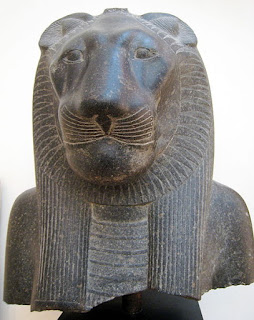Wepet Renpet Nefert (or to non-ancient Egyptians, Happy New Year!)
The
Egyptians would probably have been rather bemused by all the recent fuss about the
2012 apocalypse, because to them, every year was potentially their last.
 |
| The Goddess Sekhmet, National Museum, Copenhagen |
The
Egyptian civil calendar consisted of 360 days, with five 'days upon the year'
added to the end. These five extra days were regarded as a dangerous,
transitional time, when the goddess Sekhmet controlled 12 demonic murderers. These demons travelled
the earth shooting arrows from their mouths, and caused plague wherever they wandered.
To protect themselves, the Egyptians performed rituals and wore charms around
their necks; this was thought to pacify Sekhmet, ensuring her protection
instead of her wrath.
Remember
this when moaning about your taxi being late this New Year's Eve night - it
could be worse, you could be worried about phlegm-coated arrows being fired
your way, or think that every odd cough is the onset of plague. It makes the norovirus
look tame by comparison.
New Year's
Day itself - called wepet renpet 'the
Opener of the Year' - was regarded as the birthday of the god Re-Horakhety.
Although the Egyptians believed that the sun was reborn and grew old over the
course of each day, they also saw the same process over the course of the year,
with the sun born on New Year's Day and growing increasingly frail over the year's
final few months. This is another reason why the end of the year was so
dangerous: the sun god was weak and vulnerable to attack from his enemies, if
he were to be defeated, the new year might never arrive.
Naturally,
when the sun rose on New Year's Day, it was a time of great relief; the end of
the world had been averted (again). People made offerings to Re-Horakhety at
sunrise, and then poured black ink into the Nile for the goddess Nut and the god
Nun. They also cleansed themselves by bathing in the Nile (perhaps getting
covered in black ink in the process...). Afterwards, they applied their best green
eye makeup and went off to get trashed at riotous banquets, proving once again that
nothing ever changes.
.jpg) |
| A New Year's Flask in the Walters Art Museum, Baltimore |
So, this new year celebration, try to approach the occasion like an ancient Egyptian: keep safe from evil plague-infested demonic murderers this New Year's Eve, and (if awake and functioning) celebrate the rising sun on New Year's Day, safe in the knowledge that the sun god has defeated his enemies and has been reborn anew!